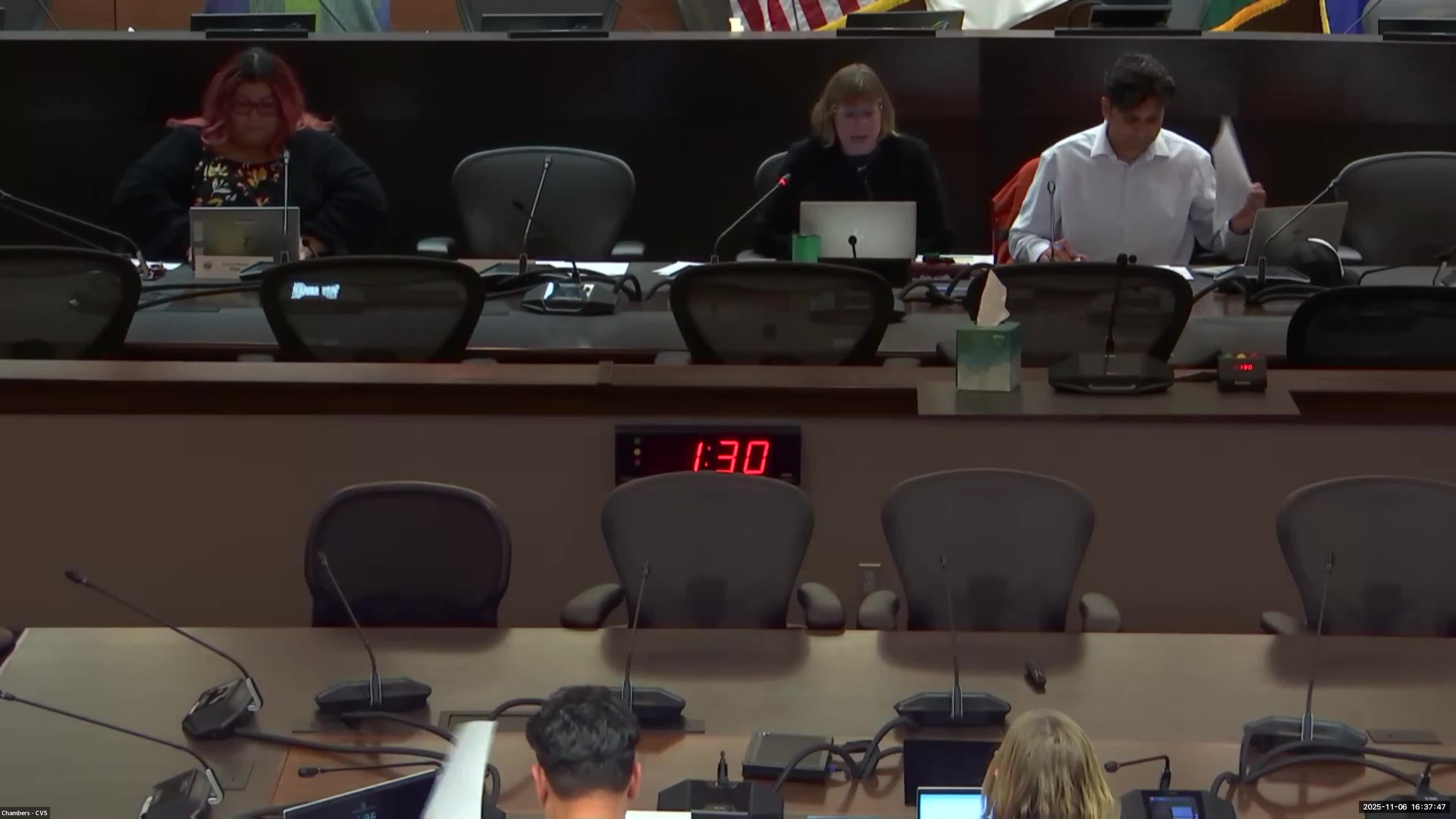Tacoma committee sends Landlord Fairness Code changes to council after hearing nonprofit and landlord concerns
Get AI-powered insights, summaries, and transcripts
Subscribe
Summary
The Community Vitality and Safety Committee voted Nov. 6 to forward proposed amendments to Tacoma's Landlord Fairness Code Initiative to the full City Council and asked staff to draft code language defining "undue and significant economic hardship," clarifying a "small landlord" exemption, and adding standards and accountability for selling a unit and for owner-or-family occupancy.
The Community Vitality and Safety Committee voted Nov. 6 to forward proposed amendments to Tacoma's Landlord Fairness Code Initiative (LFCI) to the full City Council and asked staff to draft ordinance language defining "undue and significant economic hardship," clarifying a "small landlord" exemption, and adding standards and accountability for selling a unit and for owner-or-family occupancy.
The committee's action followed nearly an hour of public comment from nonprofit affordable-housing providers, tenant advocates and small landlords. Amanda Deshay, executive director of the Tacoma Pierce County Affordable Housing Consortium, told the committee she supported exempting nonprofit affordable housing from the LFCI and described a case Mercy Housing Northwest reported in which a tenant allegedly flooded units multiple times and the organization reported roughly $800,000 in damages and related costs. "Please consider exempting affordable housing from LFCI," Deshay said.
April Black, executive director of the Tacoma Housing Authority, said the agency had seen a jump in delinquencies since the measure passed, saying 40% of its tenants were more than 30 days behind on rent compared with about 15% in 2019, and reported more than $530,000 in delinquent rent currently on the authority's books. Black told the committee that those delinquencies were delaying conversion of a recent project from construction financing to permanent financing and that a six-month delay could add an estimated $800,000 in expense that would otherwise serve households on the waiting list.
Tenant advocates pushed back against proposals to add means-testing for eviction protections. Devin Rydell Kelly, co-director of Tacoma for All, summarized analysis from the LFCI study group showing late rent payments and eviction filings are concentrated among lower-income renters and said his review of the study-group data and legal practitioners' experience did not support means-testing. "High rent earners aren't paying rent late and aren't abusing the eviction protection," Kelly said.
Speakers representing nonprofit operators described rising receivables and increased administrative burdens. Adrienne Rins, vice president of resident services at Mercy Housing Northwest, said the organization's past-due receivables rose from about $144,000 to $272,000 after the measure passed and that repeated flooding of a unit forced moves and repairs that Mercy estimated cost more than $800,000.
Small landlords also testified that uncertainty and restrictions made it harder to sustain affordable units. Mike Laborn, owner of Domatech Housing, said he had sold or removed 16 low-income units from Tacoma since the measure took effect and described units with months of unpaid rent that could not be resolved under current eviction timelines.
On policy, staff presented six topics requested at a previous committee meeting. Senior council policy analyst Linda Foster reviewed research from the Municipal Research and Services Center, Seattle and King County codes, and relevant state law and noted that a workable definition of "undue and significant economic hardship" is typically developed for adjudicators and courts and requires an individualized assessment of the unit owner's finances, the unpaid-rent amount and related expenses.
On the question of "small landlords," staff proposed using the rental-housing-code definition of "owner" and an exemption threshold consistent with Seattle's winter-eviction-defense exemption (landlords who own four or fewer rental units within city limits). Foster explained that the rental-housing-code approach counts cross-ownership structures and LLCs against a single owner to prevent circumvention.
Committee members discussed whether damage to units (nonmonetary lease breaches) is already covered by existing 10-day "notice to comply or vacate" provisions tied to just-cause evictions and ultimately agreed to postpone deeper work on that topic until the 2026 work plan and the rental housing code review, citing the complexity and need for broader input.
For exemptions tied to selling a unit or an owner or family member occupying a unit, staff described language used in the rental housing code and Seattle code that creates rebuttable presumptions (for example: listing the unit for sale within 30 days and selling or not rerenting within 90 days; owner must occupy the unit for a minimum period). Staff also reminded the committee that enforcement of the LFCI is a civil remedy in Pierce County Superior Court and that the existing measure includes statutory remedies and fines for violations.
The committee adopted a motion to forward the proposed changes to the full City Council and directed staff to draft code language reflecting the committee's intent on four specific items: (1) a definition of "undue and significant economic hardship," (2) a clear small-landlord/owner definition aligned with the rental housing code, (3) standards and accountability for selling a unit, and (4) standards and accountability for owner-or-family occupancy. The motion passed on a voice vote; the transcript records the motion and that the motion carried but does not list numerical vote tallies.
Committee members said they expected staff to return with ordinance text and that some topics (notably damage-to-unit issues and possible AMI or tenant-payment requirements for the school-year moratorium) would be revisited in January or folded into the 2026 rental housing code work plan.
The meeting concluded with scheduling notes: the Nov. 13 meeting was tentatively canceled and the Dec. 11 meeting will include 12 Community Police Advisory Committee interviews.
